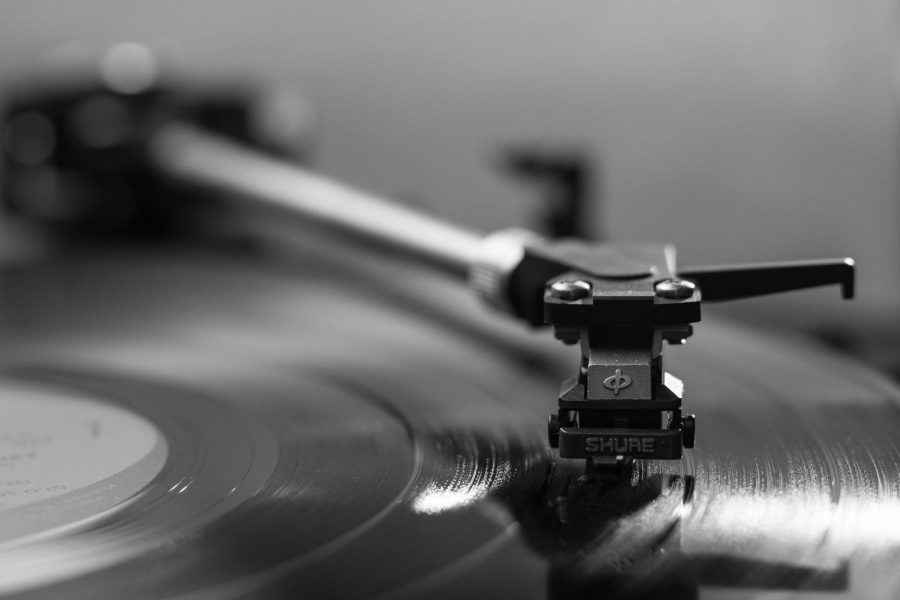Going on Record about Records
May 24, 2021
It is easy to see a vinyl record as a flat, plastic disk that turns round and round, producing sound as a needle moves across its ribbed surface. However, in owning a record player, I have found something far deeper. Whether it be placing a record down with care, owning one at a time when ownership has been lost to the digital age, or playing one with fond memories attached, records provide an experience that has become incredibly elusive in the digital media age. For all these reasons, I offer my wholehearted endorsement to the vinyl record format.
Playing a record is a deliberate process. You must first choose what you’ll be listening to (there are no YouTube recommended songs or Spotify shuffle playlists). So instead, you will flip through your box of records until you physically hold in your hand the album you want to spin. Perfect. Now what? Well, now you have to remove the record from its sleeve and expertly place it on the record player itself. While this may seem like a simple act, one must exercise the utmost caution not to touch the surface of the record lest they speed up the natural process of the record’s aging—a stark contrast to the evergreen digital format. Precision and skill must meet when you drop the needle onto the record. (I use “drop” as the popular version of the term when in fact “dropping” the needle in the literal sense could cause great damage to the record. The actual process is far more akin to gently placing the needle down and then walking away slowly so as not to disturb the record player once the music has begun.) Once the needle is safely down, you can relax and enjoy the music, having overcome a gauntlet of tasks designed to test your skills with consequences that could damage a family antique or a treasured record of your own.
Though this process may sound tedious, it is, in reality, incredibly peaceful and enjoyable—more like meditation than a stressful experience. This isn’t the same as glancing at your phone to press the play button as you frantically type out the paper due tomorrow. This is something different. It is the feeling of triumph every time you noiselessly place the needle down. The feeling of satisfaction as you hold the record cleaning brush against the turning record as it turns out the other side looking clean and fresh. The feeling of anticipation as you listen to the needle beginning to move along the grooves. Suffice to say, putting up with the inconveniences of the format shouldn’t be worth it, but sitting down and experiencing the record is always a worthwhile reward for your patience.
The music industry itself has been experiencing a shift over the past decade. The public desires instant gratification; the music industry delivers. Streaming music is more popular (and profitable) than ever. While nowhere near the highs of the ‘70s and early ‘80s, vinyl records have steadily increased their share of the market over the past decade and just last year surpassed CDs in profits according to the Record Industry Association of America. Why is this? Records have experienced a resurgence for a variety of reasons, but one that I am familiar with is the desire to reclaim that which has been lost to the digital age. There is something to be said for digital music, of course. It makes a wider variety of music available to more people than ever. Gone are the days of having to own a radio, cassette-player, CD-player, or even a record player. None of this expensive equipment is required as long as you have access to the internet. However, something is lost in return. Maybe it is the simple “magic” of playing a record for the first time and really listening to it and appreciating it—as opposed to simply putting an endless loop of songs on shuffle and allowing it to serve as background noise. There is the pleasure of physically owning an item, something else which is fast slipping away. Digital music, and other digital media formats, can be sold or streamed, but neither way matches the sense of ownership one feels for a physical object; perhaps at best listening to digital music feels like borrowing something that ultimately belongs to someone else.
Why does ownership matter? It is the same music, after all, and you can enjoy it just as often. While this may be true, ownership has more to do with memories. Many of my records were given to me by my grandparents when they gifted me their record player. I immediately fell in love with many of their records—both those I had heard before and those I had not. I felt an attachment to these records because they were owned by my grandparents and because they remind me of them every time I play them. While I could listen to the same songs digitally, I could never hold a digital song the same way I hold a record that had been passed down to me. It is like holding a memory in solid form, and it is something I share with my grandparents. So while a digital song may simply tickle a memory at the back of my mind, a physical record is a connection to my grandparents and to shared memories.
With all that said, I highly encourage you all to give some thought to owning a record player. Whether it be for the meditative experience of playing a record, an interest in better appreciating the music you listen to, or a desire to make memories of your own, owning a record player can be a fantastic experience for anyone. So, even though digital music is booming, why not help records make their comeback? If you’re interested in the specifics of purchasing a record player, a companion article comparing two different setups will be released shortly and will be available here.






